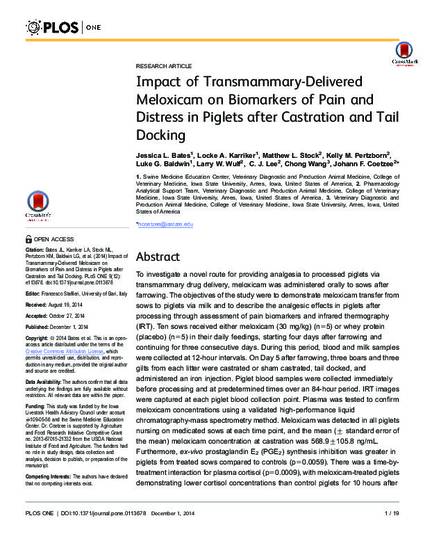
To investigate a novel route for providing analgesia to processed piglets via transmammary drug delivery, meloxicam was administered orally to sows after farrowing. The objectives of the study were to demonstrate meloxicam transfer from sows to piglets via milk and to describe the analgesic effects in piglets after processing through assessment of pain biomarkers and infrared thermography (IRT). Ten sows received either meloxicam (30 mg/kg) (n = 5) or whey protein (placebo) (n = 5) in their daily feedings, starting four days after farrowing and continuing for three consecutive days. During this period, blood and milk samples were collected at 12-hour intervals. On Day 5 after farrowing, three boars and three gilts from each litter were castrated or sham castrated, tail docked, and administered an iron injection. Piglet blood samples were collected immediately before processing and at predetermined times over an 84-hour period. IRT images were captured at each piglet blood collection point. Plasma was tested to confirm meloxicam concentrations using a validated high-performance liquid chromatography-mass spectrometry method. Meloxicam was detected in all piglets nursing on medicated sows at each time point, and the mean (± standard error of the mean) meloxicam concentration at castration was 568.9±105.8 ng/mL. Furthermore, ex-vivo prostaglandin E2(PGE2) synthesis inhibition was greater in piglets from treated sows compared to controls (p = 0.0059). There was a time-by-treatment interaction for plasma cortisol (p = 0.0009), with meloxicam-treated piglets demonstrating lower cortisol concentrations than control piglets for 10 hours after castration. No differences in mean plasma substance P concentrations between treatment groups were observed (p = 0.67). Lower cranial skin temperatures on IRT were observed in placebo compared to meloxicam-treated piglets (p = 0.015). This study demonstrates the successful transfer of meloxicam from sows to piglets through milk and corresponding analgesia after processing, as evidenced by a decrease in cortisol and PGE2levels and maintenance of cranial skin temperature.
Available at: http://works.bepress.com/chong-wang/49/

This article is from PLOS ONE 9 (2014); e113678, doi: 10.1371/journal.pone.0113678. Posted with permission.